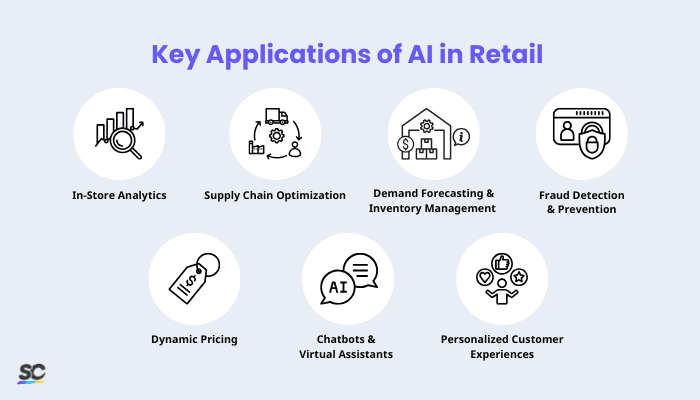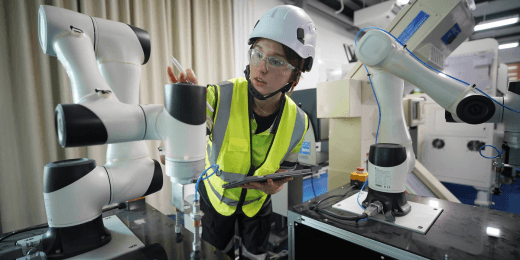AI in Retail: Transforming the Shopping Experience
Unlock the potential of AI in retail and explore ways to boost sales, improve customer experience, and streamline operations through this revolutionary tech.

Published 6 May 2025
Article by
6 min read
What is AI in Retail?
AI in retail is the application of artificial intelligence to improve various aspects of a retail business, from daily housekeeping and inventory management to customer experience and sales optimization. AI-powered solutions enable retailers to predict demand, automate supply chain tasks, and personalize shopping experiences for better customer satisfaction and increased profitability.
Benefits
Artificial intelligence has grown exponentially since its conception and is now adopted across industries for various applications. The use of AI in retail management gained traction in the early 2010s, from personalizing recommendations through predictive analytics to enhancing customer service with chatbots and virtual assistants.
As this innovation continues to evolve, learn the specific benefits of AI in retail and why investing in this is crucial for success:
Highly personalized customer experiences – The technology empowers retailers to deliver better shopping experiences by tracking the customer journey . It fosters deeper customer engagement for enhanced loyalty and increased revenues.
Streamlined operations with lower overhead costs – Automating repetitive tasks means minimizing expenses and freeing up human resources for more strategic initiatives. Many companies now use chatbots to handle routine customer inquiries, allowing customer service agents to deal with complex issues.
Better decision-making – Because AI can process and interpret vast caches of information, retailers can make informed decisions across all business facets, from inventory to marketing. Best of all, managers can accomplish this quickly, which is crucial when threats need to be managed immediately.
Enhanced supply chain efficiency – There are numerous AI use cases in retail, from accurately forecasting demand and ensuring optimal inventory levels to optimizing delivery routes for the timely and efficient delivery of packages.
Robust data protection and physical security – AI-powered systems can proactively identify fraudulent activities online and in brick-and-mortar stores. Investing in related technologies safeguards both the retailer and its customers.
Improved managerial productivity – AI cuts hours of low-value work each week, saving retail managers more than six weeks a year. That’s time they can spend driving store performance, improving customer experience, and putting new ideas into action.
Retail's $21 billion bleeding profit
Discover how much productivity leaks from middle management—and how the right tools can turn wasted hours into progress.
Key Applications of AI in Retail Stores
Technology has revolutionized how retailers conduct business. The various AI applications in retail are just a few examples of how digital transformation improves traditional processes and creates new growth and innovation opportunities. Here’s how AI is used in retail, including specific digital tools and solutions:

Key Applications of AI in Retail
In-Store Analytics
Analytics has become a decision-making cornerstone across industries. Laborious and often erroneous manual data collection has been replaced with fast, scalable tech that provides real-time results.
Digital retail checklists , one of the most rudimentary tools for inspections and audits, can gather information about brand compliance, inventory, and security.
Video surveillance with sensor technologies tracks foot traffic, customer behavior, and shelf engagement.
Supply Chain Optimization
Numerous issues could disrupt the supply chain, from sudden geopolitical instability to daily logistical challenges. AI enhances visibility for prompt risk management and streamlines various processes.
Supply chain management checklists are the most cost-effective tool for basic inspections and quality control reviews.
Centralized dashboards facilitate communication with suppliers, improving collaboration for optimized operations.
Comprehensive platforms offer end-to-end solutions, integrating various supply chain aspects for efficiency.
Digitize Your Retail Operations for Future Growth
Simplify processes, improve decision-making, and create seamless customer experiences with digital solutions.
Demand Forecasting and Inventory Management
Stockouts and excess stocks are serious problems experienced by supermarket complexes and small specialty shops. Weeks or months of going through salient information and manually counting products on shelves are now replaced by artificial intelligence.
Digital inventory checklists are used for real-time audits and logged into centralized dashboards to ensure stock accuracy, reduce shrinkage, and minimize waste.
Cloud data warehouses, advanced statistical software, and data visualization tools are used to analyze historical sales data, market trends, and other relevant factors to forecast future demand .
Fraud Detection and Prevention
Utilized in online and physical shops, AI can identify suspicious transactions, odd behaviors, and security threats in real time.
Digital security checklists can be used for audits to review and track internal theft, fraud, and other operational risks.
AI-powered facial recognition and anomaly detection systems enhance store security in larger department stores and high-end shops.
Dynamic Pricing
AI-powered systems can adjust prices instantaneously based on inventory levels, demand, and competitor pricing. Many online shops, hotels, and airlines implement this strategy to maximize sales and profits.
Price monitoring software scrubs the internet for competitor pricing.
Business intelligence platforms analyze sales data, customer data, and other relevant information.
Chatbots and Virtual Assistants
One of the most effective AI applications in retail, they provide 24/7 customer support, answer queries, offer product recommendations, and even process orders. Most businesses utilize Natural Language Processing (NLP) to understand and respond to customer inquiries in a human-like manner.
Personalized Customer Experiences
By using AI in retail to analyze customer data and behavior patterns, businesses can now provide highly personalized shopping experiences. Machine learning algorithms predict customer preferences and create tailored product recommendations, helping managers plan promotions, disseminate marketing information, and develop loyalty programs.
Best Practices for Overcoming AI-Related Issues
Getting any form of digital transformation underway can be daunting. It presents numerous challenges that may be difficult to handle without adequate preparation. Get to know some of the most common challenges and learn how to address them effectively:
Data privacy and security concerns have become a multi-billion-dollar problem, with malicious actors who want to steal customers’ information for personal gain. Robust data management is vital to boost security measures and ensure compliance with strict data privacy laws like the California Consumer Privacy Act (CCPA) and the General Data Protection Regulation (GDPR).
The high cost of implementation has always been an issue for any company, even large global enterprises. Start with small initiatives or solutions with a clear, rapid, and high Return on Investment (ROI) and focus the company’s resources on that.
Integration with legacy systems can be problematic, especially with small to medium-sized businesses without funds for a complete tech overhaul. Gradually implementing targeted solutions and incrementally integrating them into existing systems allow for adjustments while preventing major disruptions.
The growing skill gap may continue because constant digital transformations may outstrip the availability of talent. Hence, investing in employee training is non-negotiable. Aside from ensuring that workers have the skills to work effectively with AI technologies, this improves employee engagement and fosters a better culture in the company.
Resistance to change should be expected because of speculations that AI systems might replace human labor. Aside from engaging with the workforce to ensure that ethical considerations will be prioritized, top leadership should understand the importance of the human touch in customer interactions. Maintaining personalized and human-centric experiences will never go out of style.
Successfully Implement AI in Retail with SafetyCulture
Why Use SafetyCulture?
SafetyCulture is a mobile-first operations platform adopted across industries, such as manufacturing, mining, construction, retail, and hospitality. It’s designed to equip leaders and working teams with the knowledge and tools to do their best work—to the safest and highest standard.
Monitor the progress of AI-related initiatives by conducting quality checks using customized templates and immediately addressing process issues before they escalate. Track the new system’s impact by analyzing retail KPIs and leveraging insights for ongoing optimization and strategic improvements. Efficiently manage AI implementation, ensuring operational efficiency and regulatory compliance through a unified platform.
✓ Save time and reduce costs ✓ Stay on top of risks and incidents ✓ Boost productivity and efficiency ✓ Enhance communication and collaboration ✓ Discover improvement opportunities ✓ Make data-driven business decisions
Related articles
Operations
Business Processes

Understanding the Importance of Process Automation Reliability
Learn how reliable process automation is key to safe, consistent operations and how it minimizes quality and compliance risks.
Logistics
Operations

Transportation and Logistics: What’s the Difference?
Learn about the importance of transport and logistics within the supply chain and how it is used in business operations.
Logistics
Operations

An Overview of Transport Network Analysis
Learn about transport network analysis and how network-level insight improves reliability and reduces operational risk.